Tinnitus Assesment at Communikare Hearing Aid Centre
Admin
January 12, 2023

Tinnitus Assesment at Communikare Hearing Aid Centre
A tinnitus assessment is the second component of audiologists comprehensive tinnitus
evaluation, following a conventional hearing assessment. This overview focuses on
specialised tinnitus tests that exceed a standard audiological hearing evaluation in order to
acquire a clear and comprehensive clinical picture of the tinnitus patient.
How does Communikare do tinnitus assessment?
After an initial hearing test, a specific assessment for tinnitus includes subjective
measurements, objective measurements, and psychoanalytic questionnaires. These are used
to measure tinnitus symptoms and figure out how they affect the quality of life of the person
with tinnitus. This step also helps audiologists divide tinnitus into subjective vs. objective
(pulsatile) tinnitus, primary vs. secondary tinnitus, acute vs. chronic tinnitus, and
bothersome vs. non-bothersome tinnitus.
Tinnitus is often caused by hearing problems like hearing loss and hyperacusis, but it can
also be caused by non-hearing problems like stress, anxiety, depression, and insomnia.
Symptoms of Quantifying Tinnitus
Subjective measurement: Tinnitus Questionnaires
- A tinnitus assessment protocol has tools and questionnaires to measure how the
person with tinnitus reacts to it and how much it bothers them. - The Tinnitus Handicap Inventory (THI), Tinnitus Functional Index (TFI), and
Tinnitus and Hearing Survey (THS) are three tools that can be used to assess tinnitus
from the patient’s point of view. - The THI, TFI, and THS measure and scale the severity and negative effects of tinnitus
on the patient. These tinnitus assessment tools are also used to track how well
treatment and management of tinnitus is working.
Objective measurement: Specific Tinnitus Assessment
- In the second step of tinnitus assessment audiology, the patient’s perceived pitch,
loudness, and ability to be covered up by other sounds are better defined. - Psychoacoustic measures for these important signs of tinnitus include matching pitch
and loudness, testing the minimum masking level, and testing residual inhibition. - Tinnitus pitch and loudness matching is important when prescribing amplification
for this group. - Research shows that tinnitus patients benefit more from hearing aids when their
psychoacoustic characteristics fall within the frequency bandwidth of the device.
Psychoanalytical questionnaires pertaining to mental health
- In the final step of a tinnitus evaluation, psychoanalytical questionnaires help
identify any emotional distress experienced by patients with tinnitus symptoms. - Depression, anxiety disorders, sleep disorders, and post-traumatic stress disorder are
among the most prevalent mental health issues connected with annoying tinnitus. - Understanding a tinnitus patient’s psychological well-being in more depth is
essential for designing the most effective tinnitus care approach and enhancing the
patient’s quality of life.
The therapeutic efficacy of counseling for patients with tinnitus is well-established and is
one of the most essential components of audiological therapies, according to Communikare.



Categories

We Care for Your communication,
Quality Care from Quality Experts.
Quick Links
Subscribe Our Newsletter
You’ll receive regular updates on our special offers, and other exciting news.
www.communikare.in